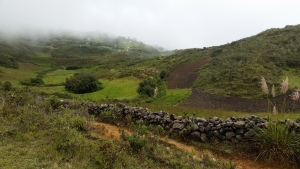Human Rights Clinic Travels to Peru to Support Communities Defending their Environment from Mining Risks
Human Rights Clinic students Carolyn Forstein JD ’15 and Daniela Paez Cala LLM ’15 reflect on working with communities and activists in
Cajamarca, Peru.
New York, April 20, 2015 - As students in the Human Rights Clinic, we have worked this academic year on developing legal strategies to support communities defending their environment and human rights against the harmful impacts of large mining projects in Cajamarca, Peru. In March this year, with Clinic Teaching Fellow Benjamin Hoffman, we travelled to Lima and Cajamarca, where we met with organizations, activists, and affected communities to discuss and advance the strategies.
International gold mining companies have been operating in Cajamarca for over twenty years. During this time, civil society actors and local communities have repeatedly raised concerns about companies’ environmental and human rights records, and have highlighted how the mining projects have failed to lift the region into promised economic development. Minera Yanacocha, one of the largest gold mining corporations in South America, is now proposing a new mining project known as Conga, which many local communities oppose because of their concerns over the project’s impacts on the environment.
Local leaders and community members argue that the Conga project is not environmentally viable because of likely harms to the ecosystem, water, and thousands of people living nearby. The project proposes draining multiple lakes in the highlands of Cajamarca to mine gold from the lake basins, and to construct reservoirs to replace the water supply for the region. Community members fear that the artificial reservoirs could not sustainably replace the natural lakes, which feed rivers and streams upon which hundreds of communities depend for clean water for agriculture, raising livestock, and personal use. Local leaders are concerned that the project may also have severe consequences for both air quality and biodiversity in the region.
We were impressed by the extensive time and effort these leaders have invested in analyzing the impacts of the mining industry in Cajamarca, and inspired by the commitment of the community to pursuing their vision of sustainable development.

Farmland that locals are organizing to protect from the negative consequences of new mining in the region. |
Local communities say that the project has already adversely impacted human rights. There are credible allegations of abuses by company security forces, including violent repression of peaceful protests against the project and in defense of the lakes. Leaders also point to what they see as the company’s pattern of bringing criminal complaints against civil society leaders, a tactic which they believe to be a deliberate attempt to undermine organized opposition. There are also concerns about forced displacement of those living near the mine concession area, such as the case of Máxima Acuña de Chaupe and her family, who have allegedly been subject to hostile treatment, raids, and intimidation by mine security personnel, and unsuccessful criminal complaints regarding their refusal to relinquish possession.
During our trip, we met with leaders to discuss the legal context for these concerns and the potential application of international norms and legal strategies to support their opposition. These meetings also invited us to think about different ways of supporting a social movement, and gave us new tools to question development models and corporate social responsibility standards.
The Clinic will continue working in collaboration with these communities in developing these strategies over the next several months, and is planning a return trip to Cajamarca in the fall.
###
The Human Rights Clinic is an intensive year long course directed by Sarah Knuckey, the Lieff Cabraser Heimann and Bernstein Clinical Associate Professor of Human Rights and the faculty co-director of the Human Rights Institute at Columbia Law School, as well as by Clinic Fellow Benjamin Hoffman. The Clinic brings together human rights work, student education, critical reflection, and scholarly research. Students are trained to be strategic human rights advocates, while pursuing social justice in partnership with civil society and communities, and advancing human rights methodologies and scholarship.
